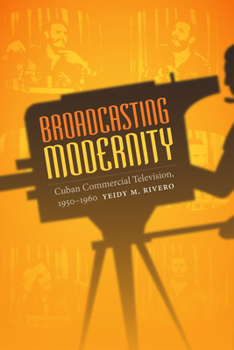Broadcasting Modernity: Cuban Commercial Television, 1950-1960
(Part of the Console-ing Passions: Television and Cultural Power Series)
Select Format
Select Condition 
Book Overview
The birth and development of commercial television in Cuba in the 1950s occurred alongside political and social turmoil. In this period of dramatic swings encompassing democracy, a coup, a dictatorship, and a revolution, television functioned as a beacon and promoter of Cuba's identity as a modern nation. In Broadcasting Modernity, television historian Yeidy M. Rivero shows how television owners, regulatory entities, critics, and the state...
Format:Hardcover
Language:English
ISBN:082235859X
ISBN13:9780822358596
Release Date:March 2015
Publisher:Duke University Press
Length:264 Pages
Weight:1.04 lbs.
Dimensions:0.7" x 6.8" x 9.1"
Customer Reviews
0 rating





